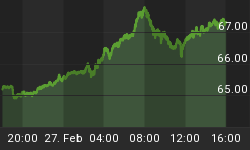ECB President Trichet has stated that the ECB will sterilize any purchases of sovereign debt it purchases in the secondary market. In other words, the ECB will drain by other means the amount of base money it creates through sovereign debt purchases. If credit creation by euro-area financial institutions and the euro money supply were surging, then Trichet would be correct in prescribing sterilization. But is Trichet fighting the last inflation war? Chart 1 shows that growth in both credit creation by euro-area monetary financial institutions and the euro M3 money supply is hovering near zero.
Chart 1
Chart 2 shows that the change in euro-area consumer prices has indeed moved back into positive territory at an annual rate of 1.5%. But if Milton Friedman was correct that inflation is everywhere and always a monetary phenomenon, then Trichet need not worry about a sustained acceleration in euro-area inflation given what currently is happening to euro-area money and credit aggregates. Rather, if he does not get these aggregates growing, Trichet might be creating the conditions for the euro-area's lost decade a la Japan. So, go ahead and walk on the wild side, Claude. Practice unsterilized sovereign debt purchases for a while.
Chart 2















